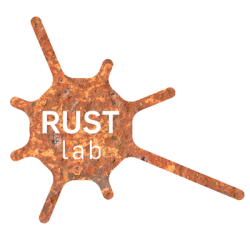
Many of our activities take place in the RUSTlab. For information please see: https://rustlab.ruhr-uni-bochum.de/
4th-5th June 2025, Freie Universität Berlin
Olga Galanova will take part in the conference of the Diskursmonitor research group, entitled "„Das geht zu weit!“ Sprachlich-kommunikative Strategien der Legitimierung und Delegitimierung von Protest in öffentlichen, medialen und politischen Diskursen“. Based on current developments in Germany and abroad, the conference, which will take place from June 4 to 5 in Berlin, aims to discuss the linguistic and communicative strategies with which rival actors attempt to legitimize or delegitimize various forms of protests. With her talk „Delegitimierung von Protest als Interaktionsprozess: Zur kommunikativen Resilienzunterdrückung in Diktaturen,“ Olga Galanova contributes to the conference theme regarding the delegitimization of protest in dictatorships.
More information can be found here.
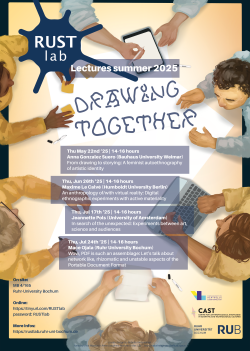
Summer Term 2025, MB 4/165 at Ruhr-University Bochum and on Zoom
The programme for the 13th round of the RUSTlab Lecture series is now available. The lectures will take place on site in MB 4/165 and online via Zoom. This semester's guiding theme is "Drawing Together" and speakers include Anna Gonzales Suero (Bauhaus University Weimar), Maxime Le Calvé (Humboldt University Berlin), Jeannette Pols (University of Amsterdam) and Mace Ojala (Ruhr-University Bochum). Please find more information here. Everyone is most welcome!
19th - 20th March 2025, Leopoldina Centre for Science Studies Halle (Saale)
As part of the workshop "Herausforderung von Forschung in hybriden Arenen: Forschungsalltag als Bewältigung epistemischer Heterogenität“ at the Centre for Science Studies at the Leopoldina, Estrid Sørensen will give a keynote lecture on “Formats of research in hybrid arenas”. The workshop will focus on how to deal with the double epistemic heterogeneity in everyday research. Epistemic heterogeneity is understood here in two ways: on the one hand, as the heterogeneity of knowledge sources, which is caused by the different disciplines as well as by non-academic actors, and on the other hand, the heterogeneity of relevance, i.e. heterogeneous socially relevant research. In order to examine how research takes place in such hybrid arenas, the workshop calls for reflection on the basis of three selected exploratory spaces: Knowledge Production and Knowledge Communication, Institutional Connection and Funding Structure, and Career Paths. Estrid Sørensen's talk is embedded in the first space, Knowledge Production and Knowledge Communication.
More information can be found here.
19th March 2025, 15:45-17:15, Leibniz-Institut für Deutsche Sprache (IDS) Mannheim
As part of the 24th work conference on conversation research „Responsives Verhalten: Praktiken, Handlungen und Affordanzen“, Olga Galanova will hold a data session titled „Fishing von Informationen in Anrufen bei der Stasi: Zur strategischen Initiierung des responsiven Verhaltens im geheimdienstlichen Setting“. The conference will take place from March 19 to 21 and provides a platform for presenting and discussing current work in conversation analysis and interactional linguistics as well as findings on responsive behavior in spoken German, both in informal contexts and in professional settings.
More information, including the full program and the registration, can be found here.
11th – 14th March 2025, Berlin
The RUSTlab team will be part of the 2025 STS Hub in Berlin with various individual and collaborative contributions. Based on Donna Haraway and Karen Barad’s methodology of diffraction, the current theme is "Diffracting the Critical“. It is an opportunity to collectively explore how the critical is entangled in the complex interplay of the three thematic clusters: ecologies and infrastructures, scales and temporalities, collaborations and solidarities.
Sandra Abels and Fabian Pittroff will be part of the 23rd Panel "Demarcating boundaries of and with data: Boundary work in the age of datafication", which will take place on Tuesday, March 11, between 15:00 and 16:30. Sandra Abel‘s paper "There must be something about this?!?...' – On restructuring a museum’s data-base“ is about museums as essential informational infrastructures and the structure and use of databases. "Data Spirits: Data practices along and across the boundaries of humanities research“ is the title of Fabian Pittroff‘s work. It focuses on the essentiality of data in the humanities and the possibilities of diffractive attention to shared data.
On Friday, March 14, from 9:00 to 10:30, the 30th panel "Diffraction, reflection and dissemination of/through academic disciplines. How what belongs (not) together is merging in the digital era of late capitalism is happening," in which Estrid Sørensen as well as the whole RUSTlab will participate. The latter is engaged with rusting as an intra-active notion, therefore their paper is entitled "Rusting through academic boundaries“. Estrid Sørensen’s work on "Planetary knowledge and a spheric academia“ suggests a revision of the understanding of knowledge in STS as planetary, in addition to the previous understandigs of knowledge as epistemic, social, and material.
Aditionally, Leman Çelik will present a poster during the poster session on Wednesday, March 12, between 14:00 and 15:30. Her poster, titled „Through the Eye of a Pigeon: From Life in the Lab to Data,“ focuses on the journey of data in scientific knowledge processes using the example of a biopsychological research group and lab pigeons.
13th February 2025, 16.15-17.00, Max-Weber-Kolleg Erfurt
On the 13th and 14th of February 2025, the workshop „Das Ich im Rampenlicht – Bedingungen und Kulturbedeutung moderner Selbstthematisierung“ will be held at the University of Erfurt. The workshop is a collaboration between the Max-Weber-Kolleg and the Institut Franco-Allemand de Sciences Historiques et Sociales (IFRA-SHS) and deals with the preconditions and cultural significance of self-thematization in modern societies. Olga Galanova’s talk „Selbstthematisierungen in denunziatorischen Kontaktaufnahmen zur Stasi: von moralischer Selbstentlastung zur pragmatischen Fremdbelastung“ makes a contribution in the context of denunciatory contacts with the Stasi.
More information can be found here.
15th January 2025
We warmly welcome Rahel as a new member of our team. Rahel is a student of social science with a special interest in queerfeminist and decolonial theorist. We have a lot to learn from her, and look most forward to working with her!
We congratulate our PHD candidate Heike Gerdes on her fem:talent scholarship. The scholarship is awarded by the Emden/Leer University of Applied Sciences and serves to promote young female academics.
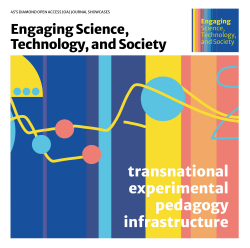
December 2024
Mace Ojala has contributed to an article on Science and Technology Studies (STS) labs in technical universities and their contribution to pedagogy and knowledge production that has now been published in the current issue of Engaging Science, Technology, and Society. The research uses the ETHOS Lab at the IT University of Copenhagen as a case study to explore how teaching can serve as a site of STS experimentation. Through three events from 2017 to 2020, the authors illustrate how the lab challenges traditional university structures and hierarchies by integrating teaching and research, rethinking space and time, and fostering feminist praxis. The article highlights the critical potential of STS labs in reshaping ways of knowing and recommends approaches for interdisciplinary and inclusive educational practices.
The article can be found here.
27. November 2024, 17:00-18:30 Uhr, Online-Podiumsdiskussion
Digitale Forschungspraktiken, die weitreichende Digitalisierung unserer Arbeitswelt und der Einsatz computergestützter Methoden in Forschung, Lehre und Vermittlung haben ökologische Konsequenzen, auch in der Geschichtswissenschaft.
Eine Vielzahl von ethischen sowie praktischen Fragen stehen im Raum: Wie lassen sich innovative digitale Ansätze mit einem klimagerechten und effizienten Energieverbrauch in Einklang bringen? Was können Forschungsinstitutionen und was kann jede:r Einzelne tun, um den Ressourcenverbrauch bei geschichtswissenschaftlichen Projekten möglichst gering zu halten? Aber auch: Was können wir aus der Geschichte an nachhaltigen Ansätzen für digitale Forschungspraktiken heute ableiten?
Die Podiumsdiskussion nähert diesen Fragen aus interdisziplinären Blickwinkeln. Unter Moderation von Mareike König (DHI Paris) diskutieren Anne Baillot (Germanistik und Digital Humanities, Universität Le Mans/ DARIAH-ERIC), Anna-Katharina Woebse (Wirtschafts-, Sozial- und Umweltgeschichte, Universität Freiburg) und Estrid Sørensen (Kulturpsychologie und Wissens Anthropologie, Ruhr-Universität Bochum).
Weitere Informationen zur Vortragsreihe und Podiumsdiskussion finden Sie hier.
Es ist keine Voranmeldung nötig. Sie können sich unter dem Link direkt einwählen.
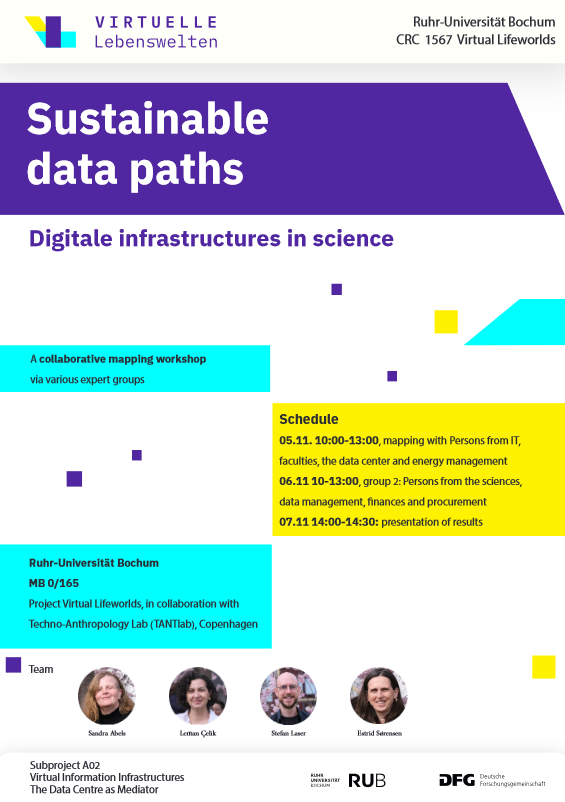
5th - 7th November 2024, MB 0/165 at Ruhr-University Bochum
As part of the CRC subproject Virtual Lifeworlds Estrid Sørensen, Stefan Laser, Leman Celik and Sandra Abels will organize a collaborative mapping workshop on sustainable data paths togehter with various expert groups.
Scientific data helps us understand and solve problems - also climate problems. Yet they themselves require increasing amounts of energy and raw materials, longer global value chains, and more bureaucracy.
Hence we ask how data and questions of ecological sustainability, as well as issues of ecological conservation are related. This includes attention to hardware and software, electricity, financing, suppliers and procurement as well as scientists, technicians, operators and managers, and regulations. It includes competences and understanding, creativity, regulations, supervision and much more. And because these all are connected, changes must be organised to work together. The aim of the mapping workshop is to draw a ''map'' of the diverse actors and components involved and discuss your concerns. The mapping will be based on ongoing research. Different actors who are involved in using, operating or supporting the university's data infrastructure are invited to share their knowledge and experiences.
More information can be found on the website of the CRC.
31th October 2024
Heike Gerdes has joined the Chair of Cultural Psychology and Anthropology of Knowledge as a PhD student studying practices around symptom-checker apps. She is particularly interested in socio-technical self-classifications and the ambivalent authorization of health. We look very much forward to learning more about this important research. Heike also brings Prof. Christiane Falge from the Hochschule für Gesundheit Bochum closer to the Chair, as she will work as Heike secondary supervisor. Sounds like an exciting adventure!
1st October 2024, Veranstaltungszentrum RUB
After eight years of inter- and transdisciplinary cyber security research the graduate school SecHuman invites to their final symposium. The event will offer greetings from the Minster of Science (NRW) Ina Brandes, rector Martin Paul and a number of engaging perspectives on the research and results of the graduate school. Journalist Eva Wolfangel will close the symposium with her perspective on contemporary challenges of cybersecurity in society. Estrid Sørensen will be the master of ceremony and take care that everyone will have a good day.
15th August 2024
We warmly welcome Aleyna as a new member of our team. Aleyna is in the midst of a Master study of Culture & Person at the Department of Social Science and is deeply concerned about contemporary social issues. We look very much forward to working with Aleyna.
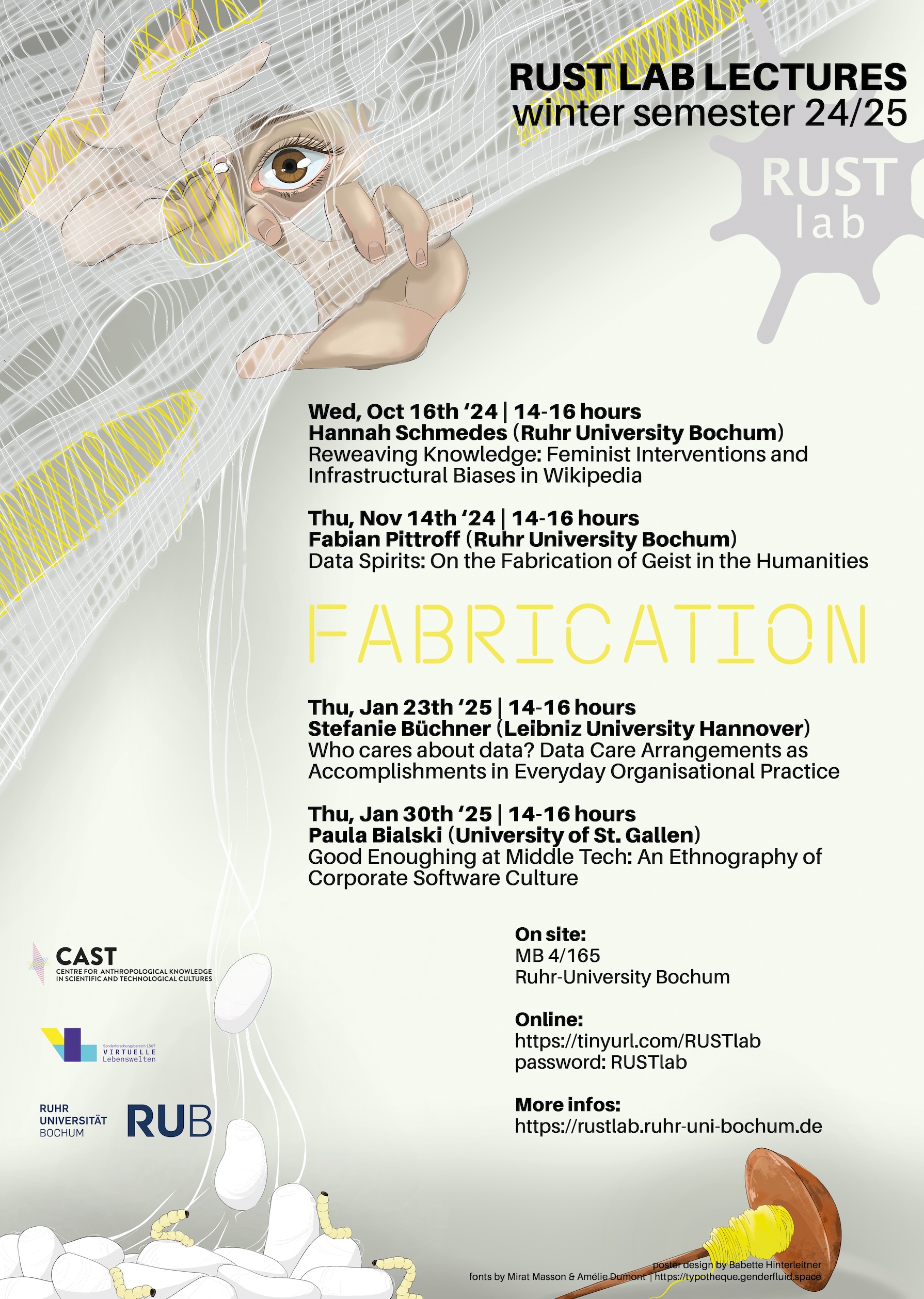
Winter Term 2024/25, MB 4/165 at Ruhr-University Bochum and Zoom
The programme for the 12th round of the RUSTlab Lecture series is now available. The lectures will take place on site in MB 4/165 and online via Zoom. This semester's guiding theme is "Fabrication" and speakers include Hannah Schmedes (Ruhr-University Bochum), Fabian Pittroff (Ruhr-University Bochum), Stefanie Büchner (Leibniz University Hannover) and Paula Bialsky (University of St. Gallen). Please find more information here. Everyone is most welcome!
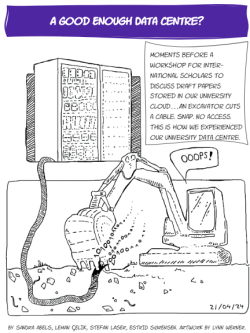
24th June 2024
Drawing on their work within the CRC subproject Virtual Infrastructures, Sandra Abels, Leman Çelik, Stefan Laser, Estrid Sørensen and Lynn Werner have published a contribution to the ICT4S Zine "Liminal Excavations". The zine explores alternative visions, ideas and critiques on the topic of sustainability and ICT. The contribution is titled "A Good Enough Data Centre?" and takes a look at different perspectives on data centres, building on interview material with scientists, procurement and data centre operators.
More information and the full zine can be found here.
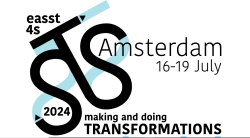
16th – 19th July 2024, Amsterdam
The CUPAK team will join the EASST-4S conference “Making and Doing Transformations” in Amsterdam and contribute to a diverse set of panels. Leman Çelik, Mace Ojala and Fabian Pittroff will chair the panel “Transforming data practices in the humanities: virtual research environments revisited”, which focuses on virtual research environments as explicit or implicit sociotechnical frameworks and imaginaries that structure the transformation of data within the humanities, where postdigital practices intersect with fictional research objects. Mace Ojala will also chair the “Hacker Cultures” Podcast Panel together with Paula Bialski (University of St. Gallen) and Andreas Bischof (TU Chemnitz). The format of this panel will be a dialectical conversation with the speakers which will be recorded and published as a podcast.
Estrid Sørensen and Stefan Laser will be convenors of the panel “Planetary Data Infrastructures” together with Nancy Mauro-Flude (RMIT) and Steven Jackson (Cornell University). With the concept “planetary data infrastructures”, the panel explores expanded engagements with networked infrastructures, both concrete and speculative, that help foster more response-able, aesthetic, cooperative, and sustainable planetary relations. Estrid Sørensen will contribute a talk on „Cuddling with servers: how to experience the planetary relations of data processing?“ to this panel, which discusses the developing of a virtual reality application to generate bodily experiences of servers. Stefan Laser will also give a contribution on “Writing predictions to perform different futures: reflections from a book collective” in the “Futures work” panel. It explores the critical and liberatory potential of predictions and discusses diverse forms of performing predictions based on an STS book project.
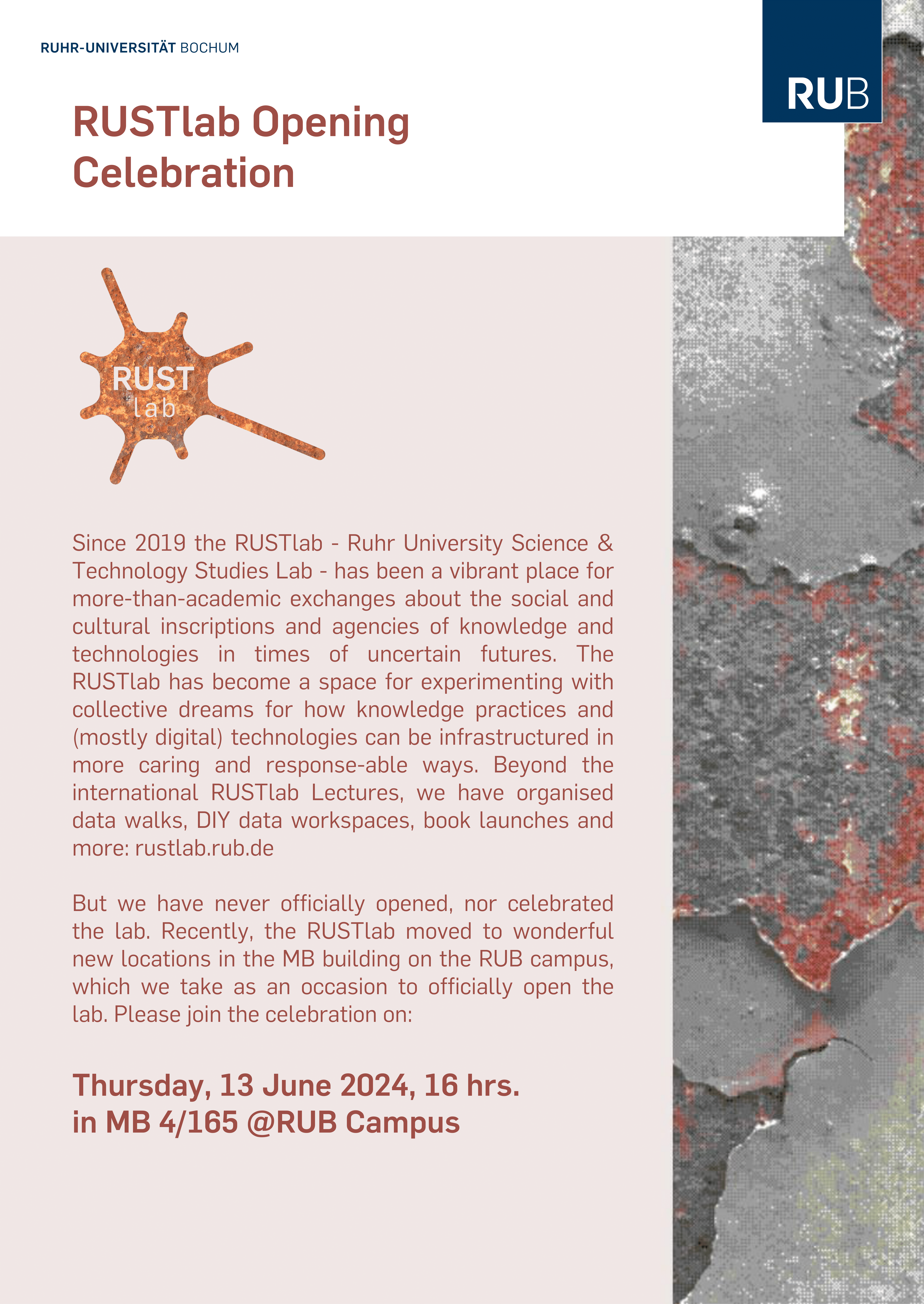
13th June 2024, 16 hrs., MB 4/165 at Ruhr University Bochum
Since 2019 the RUSTlab - Ruhr University Science & Technology Studies Lab - has been a vibrant place for more-than-academic exchanges about the social and cultural inscriptions and agencies of knowledge and technologies in times of uncertain futures. The RUSTlab has become a space for experimenting with collective dreams for how knowledge practices and (mostly digital) technologies can be infrastructured in more caring and responseable ways. Beyond the international RUSTlab Lectures, we have organised data walks, DIY data workspaces, book launches and more: rustlab.rub.de
But we have never officially opened, nor celebrated the lab. Recently, the RUSTlab moved to wonderful new locations in the MB building on the RUB campus, which we take as an occasion to officially open the lab with a celebration on Thursday 13 June 2024 16 hrs in MB 4/165 @RUB Campus. If you want to join, we would appreciate a notification on rustlab@rub.de by 8 June.
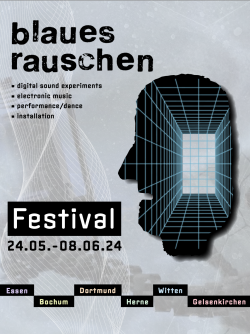
5th June 2024, 15 hrs., Quartiershalle, Stühmeyerstraße 33, Bochum
The lecture and talk "Machine Listening and Human Listening" with Mace Ojala and Marja Athi is dedicated to a reality in which technology is inexorably taking over more and more functions and tasks. The speakers want to compare the characteristics and potential of machine listening with the traditional capabilities of human listening. Are we aware of the difference between data-driven analysis and contextual understanding, between objective and subjective listening? How can we combine the two in a critical, collaborative and emancipatory way? Could listening help to resist, reject and subvert the narrow roles that our alienating consumer culture imposes on us, and instead re-tune our more-than-human ears to open-ended, democratic, poetic and careful relationships within the entangled more-than-human world on which we depend? The event is part of the festival Blaues Rauschen and will take place on 5 June 2024 at 3 pm in the Quartiershalle, Stühmeyerstrasse 33, Bochum.
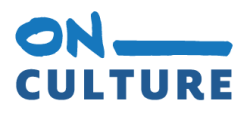
31st May 2024
An article on the academic craft of reading, written collectively by the RUSTlab, has been published in On_Culture's Issue 16 "Ways of Reading". Reading is not only a mental decoding activity but also a social, material, bodily, and affective practice. It is learned; changes over time; varies across situations; and is crucial for academic institutions. Nonetheless, academics practice reading largely individually. Yet, reading remains an undervalued part of how professional research (work) is done. In this paper, the author collective takes a practice-oriented approach: How is reading enacted as a seemingly self-evident academic technique? The paper argues that reading is a craft that requires care and companionship, and that it matters who gets to read, when and where reading is done, and what the legitimate excuses for not reading are. The author collective polemicizes that academics would do well to bring reading practices from the individualized margins to the heart of collective exchange.
The full article can be read here.
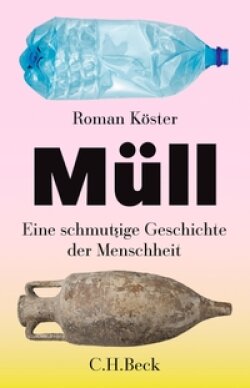
14th May 2024
In a book review for Soziopolis, Stefan Laser discusses Roman Köster's monography "Müll. Eine schmutzige Geschichte der Menschheit" (2023). He argues that the strength of the book is Köster's foresight and his critical interventions in the public discourse surrounding the “waste problem”. Stefan Laser also comments on the discussion of global conditions, as some of Köster's central concepts imply fundamental assumptions and, on closer examination, have far-reaching implications.
The full German review can be read here.
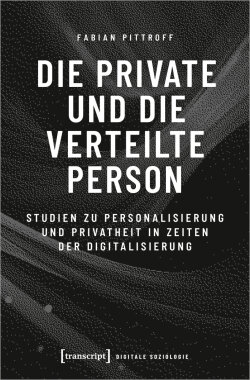
24th April 2024, 16 hrs., MB 4/165 at Ruhr University Bochum
RUSTLab cordially invites you to the launch of Fabian Pittroff's book "Die private und die verteilte Person: Studien zu Personalisierung und Privatheit in Zeiten der Digitalisierung". The monograph was published this year by transcript.
The “person” is not a synonym for ‘human’, but a social mode of existence for human and non-human beings. While the person of modernity is bound to the private sphere, it is being repositioned with digitalization. Fabian Pittroff analyses this development in a series of studies dedicated to comprehensive aspects: the social theory of the person, the history of the private sphere, the crisis of democratic institutions, the avant-garde post-privacy movement, the digitalization of friendship, the production of selfies and the predictions of the data economy. Two modes of personalization are emerging: While the private person is oriented towards a center, the distributed person exists decentrally.
13th April 2024
In an interview for Deutschlandfunk Kultur's digital culture podcast "Breitband", Stefan Laser talks about electronic waste and the responsibility of consumers and the industry. Listen to the podcast by following this link: https://www.deutschlandfunkkultur.de/zu-viel-elektroschrott-liegt-das-problem-bei-verbraucherinnen-und-verbrauchern-dlf-kultur-5c5f533e-100.html.
10th April 2024, Worms
At this year's annual conference on IT-security of the German Society for Informatics, Estrid Sørensen will together with Dominik Herrmann (Universität Bamberg), Dennis Eckhardt (Friedrich-Alexander-Universität Erlangen-Nürnberg (FAU)) and Isabel Münch (Bundesamt für Sicherheit in der Informationstechnik (BSI)) participate in a panel on "IT-security in Digitalisation of Everyday Practices". The panel is organised by Felix Freiling and will take its point of departure in questions concerning ethnography of cybersecurity practices.
More information on the conference can be found here.
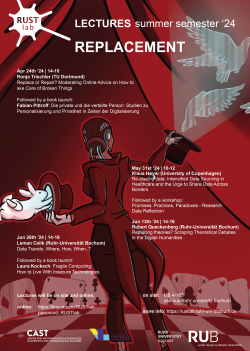
Summer Term 2024, MB 4/165 at Ruhr-University Bochum and Zoom
The programme for the 11th round of the RUSTlab Lecture series is now available. The lectures will take place on site in MB 4/165 and online via Zoom. This semester's guiding theme is "Replacement" and speakers include Ronja Trischler (TU Dortmund), Klaus Høyer (University of Copenhagen), Robert Queckenberg (Ruhr-University Bochum) and Leman Çelik (Ruhr-University Bochum). Please find more information here. Everyone is most welcome!
Find previous news in the archive.